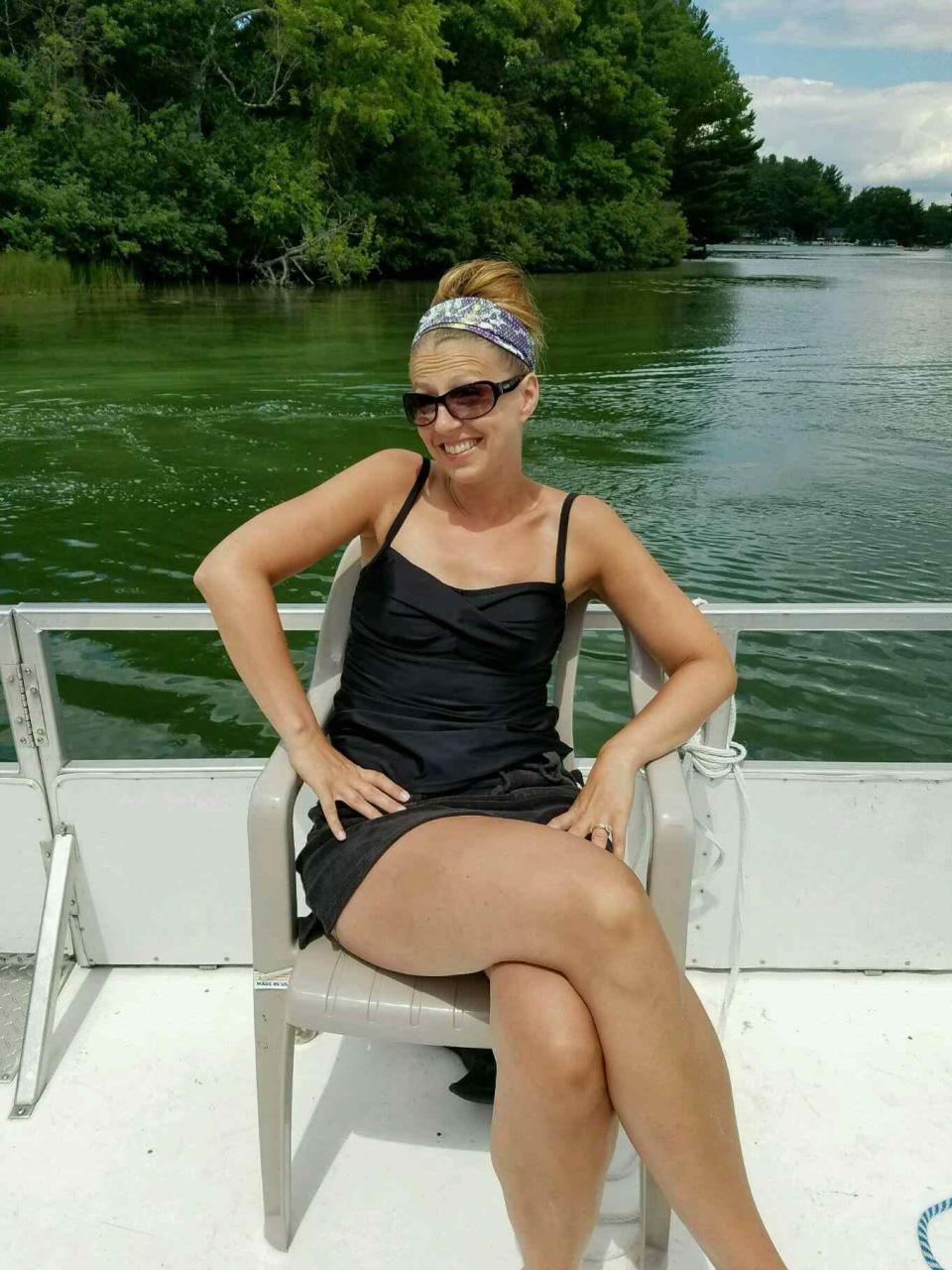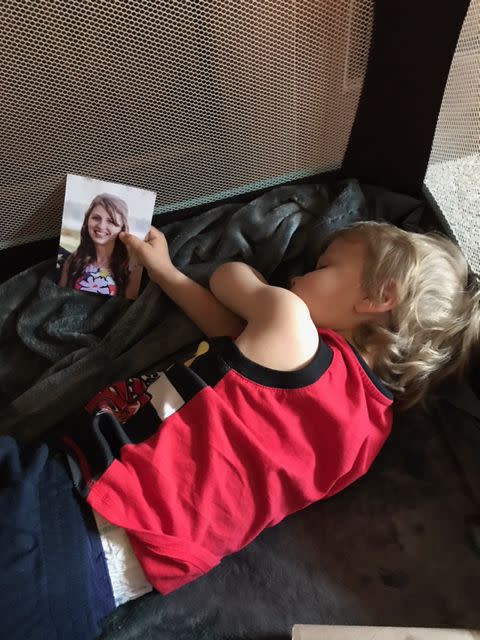Dad Vows to Tell His Wife's Story After Losing Her to Cardiac Sarcoidosis
A dad of four from Wisconsin is sharing the heart-wrenching story of losing his wife when she was just 36. Steve Ullmer took to Love What Matters to tell their love story and raise awareness about the condition that took his wife Wendy's life: cardiac sarcoidosis.
"My healthy, 36-year-old wife of nearly 13 years was gone," he wrote. "I was suddenly a single dad to 4 young boys. This wasn’t supposed to happen. This was not the story we wrote together."
The couple met in high school and had a five-year-long long-distance relationship through college. "I made so many bad choices, so many mistakes during that time, but I knew I had gotten one thing right…Wendy," Ullman wrote. "After a series of physical injuries related to my binge drinking and drug use, I became disillusioned with the lifestyle that I had idolized for so many years. I started searching for truth, reading voraciously, separating my life into spheres of 'good' and 'bad.' Wendy personified everything that was ‘good’ in my life."

He proposed in 2003, and the couple married the following year. Fast-forward to March 2017 when Wendy, then 36 and a nurse who had been "very diligent with her health," told Steve she had begun experiencing heart palpitations again. She had noticed them back in 2012 and was diagnosed with Premature Ventricular Contractions (PVCs), a common, benign condition in which extra heartbeats disrupt your regular heart rhythm, sometimes causing you to feel a fluttering or a skipped beat in your chest.

But upon noticing them again, Wendy asked her boss to order her a heart monitor, and she was wearing it when Steve returned home from work that evening.
"That night felt like any other night," he recalled in his Love What Matters piece. "We talked a bit in bed about the upcoming weekend after putting the kids down, and I fell asleep sometime around 10:30 p.m. The next thing I remember was coming out of sleep and hearing her take a breath that didn’t sound quite normal—more like a gasp. I tried to wake her up. There was no response. I shook her, screamed her name, begging her to wake up. A wave of terror came over me as I fumbled with my phone to call 911. She was no longer breathing at all, and I couldn't find a pulse. I frantically performed CPR until the sheriffs arrived. They immediately tried to revive her with a defibrillator. Nothing. Again. Nothing. Still no heartbeat. I was now hysterical, and started to call family. EMTs arrived on the scene, but were unable to revive her before taking her to the hospital."
Related Video: Flip Flop Festivus Raises Awareness for Sarcoidosis
He followed the ambulance to the hospital and learned they "had somehow restarted her heart." But the updates took a turn for the worse. "The final update hit me like a fist to the face," he remembered. "‘If her heart stops again, we do not recommend resuscitation.’ I stared blankly at him, refusing to acknowledge the statement. Not long after that, her heart stopped. I heard ‘CODE BLUE’ over the PA system as medical staff rushed into her room. I told them to resuscitate, while we prayed. They took every possible measure, a machine violently compressed her chest over and over. They would not stop until I gave the word. As each excruciating second passed, hope faded. Death was palpable, it seemed to envelop the room, with a suffocating presence. I started to get pleading looks from the doctors and nurses. I finally uttered the words, 'It's enough.'"
In the nightmarish days that followed, as the dad of four contended with grief that he said took over his mind and body, he had many questions: "Was it a heart attack? Stroke? She was wearing a heart monitor when it happened, so surely they could determine something from that, right?"
The concerned father also wondered if, given the genetic link—Wendy's father had had heart issues, and so did he—might his boys be at risk? "Suddenly, the fear of losing one of them haunted me like it never had before," Ullman wrote. "I remember calling the pediatrician’s office and telling them I needed all of their hearts checked right now. I took them to a pediatric cardiac specialist where they performed echocardiograms and sent them all home with 24-hour heart monitors. I tried to downplay all the testing, but kids are amazingly intuitive. They knew mom had died from a heart issue, and now we were suddenly focusing on their hearts. I remember my neighbor telling me her kids were scared to see my boys running around outside with heart monitors. I was too."
Finally, Ullman learned from Wendy's autopsy that she died from a disease called Sarcoidosis. "We don’t know how long she had this disease, or whether the heart palpitations she had experienced in 2012 and again in 2017 were related to it," he wrote. "We know the Sarcoidosis had gotten into her lungs, kidney, liver, and heart. Once in her heart, this inflamed tissue eventually disrupted the electrical pathways, ‘shorting out’ her heart, and causing it to stop pumping."
Cardiac sarcoidosis, specifically, is "a rare disease in which clusters of white blood cells, called granulomas, form in the tissue of the heart," according to the University of Ottawa Heart Institute. "Any part of the heart can be affected, though these cell clusters most often form in the heart muscle where they can interfere with the heart’s electrical system (conduction defects) and cause irregular heartbeats."
The grieving husband wrote that he was "thankful for a clear diagnosis," but "there was also the temptation to look back at the months and years leading up to her death and try to come up with scenarios that would have saved her. If I could just find someone or something to blame, perhaps that would bring peace."
Ultimately, he realized that "real peace, peace in your soul, needs to come from something other than yourself. It can’t be dictated by your circumstances, because circumstances are constantly in flux."
He noted that his wife's death broke him and his faith was tested. "It took a conscious effort to let go of bitterness, and view her life as a gift – not as something that was 'taken' from me," he noted. "No one saw this coming, but God did. I have even come to see the ways God was preparing Wendy, and our family for this tragedy in the years prior to her death."
Ullman said he experienced "a recurring element of clarity in a dense fog of grief." And that's when a "simple phrase" gave him "purpose and a path forward": "Tell her story."
"I had to do this," the Wisconsin dad shared. "I had to share my precious wife with the world. Not only who she was, but what she believed. Wendy’s story is one of beauty and pain, joy and sorrow…such is life."

After learning about his wife's diagnosis, Ullman took to Facebook to share a heartbreaking but centering truth: "Wendy’s days on this earth were marked out for her before she was even born. It was her time, and I have accepted that. I am thankful for a clear diagnosis. Thankful that the risk of inheritance for my boys is much lower with Sarcoidosis compared to a cardiac cause. Thankful for the years I got to spend with Wendy." And as father of four continues to tell his dearly departed wife's story, he's also "thankful for the chance to see her again."
You can read more about Wendy's story on a blog written by Steve Ullman.

